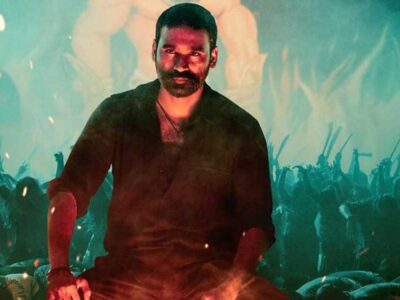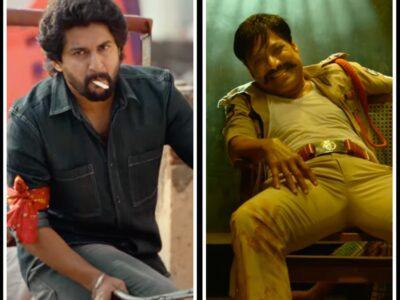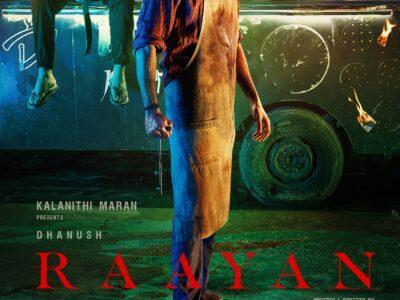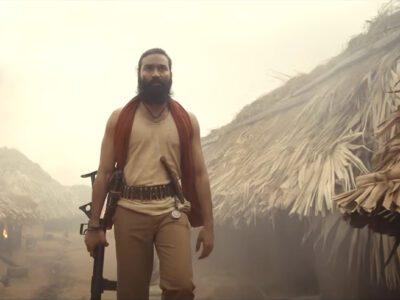Captain Miller is imperialist fiction with the spirit of a folklore film – Srivathsan Nadadhur reflects on how the Dhanush starrer is different from other tales about the colonial era
Over decades, mainstream filmmakers have captured the spirit of the colonial era mostly through biopics of real-life personalities or stories of larger-than-life, heroic protagonists who turn messiahs for their communities. One may be tempted to slot Captain Miller in the latter category, but Dhanush’s latest film is a community-centric tale as much as it is about a local hero.
Captain Miller derives its instinctive appeal through its visual aesthetic, the semi-cinematic, raw action choreography, GV Prakash’s wildly innovative background score peppered with spaghetti western influences and the unconventional world-building. Beyond freedom, the story addresses oppression through a folklore hero set against the backdrop of a temple with a compelling backstory.
The narrative is all over the place, to begin with. All you know is that the protagonist Agni is a nobody, ignored by the village and his family. When his Gandhian brother Shivanna advises him against the idea of joining the British army, Agni asks, ‘How does it matter? Regardless of the village or the army, you need to bow down and work under an oppressor.’
Agni doesn’t even have a person to write letters when he’s in the army – his mother isn’t alive and his brother is too occupied with his ideology to care, while his lady love has found her special someone already. When entrusted with the task of killing his own men and he witnesses a fellow soldier committing suicide out of guilt, something in him changes. The soldier now turns a rebel.
The story of Agni (and glimpses of his past) is interspersed with the tainted familial legacy of his romantic interest Bhanumathi. The demons aren’t only the imperialists, but also the village heads misusing their authority. While the ideas on a writing level and the ambience are rewarding, the emotional threads are vague. The film fails to emphasise why one needs to root for an aimless rebel.
The filmmaker goes back and forth across timelines, sometimes indulgently. There’s a thin line that separates detailing from indulgence and Captain Miller suffocates the viewer with the repetitive action blocks, dark humour and mythical metaphors, even though they’re executed with taste. The film only finds its footing post-intermission, as a payoff for the extensive world-building before.
Captain Miller’s narrative, since then, has the right emotional heft, is thankfully straightforward, focused and the battles – psychological, familial, external – make for juicy viewing. Like Kantara, you see a village taking charge of its cultural roots, resting its belief in a mythical hero. There’s fury, there’s redemption, there’s family sentiment and the action junkies are in for a feast.
The commercial highs through the action blocks, the strategies and the extended cameos leave you gasping for breath. The ending is as larger than life as it can get – Agni a.k.a Captain Miller, with the support of the locals, needs to fight an army of 700 men and the emotional foundation that unleashes their fury is explosively set up. Yet, Captain Miller is not a fully satisfying film – the parts shine more effectively than the whole.
There’s every reason to believe that Captain Miller was conceived as a two-part franchise. The creators, hence, prioritise world-building over a riveting screenplay. The film is overloaded with inventive ideas and diverse characters with conflicting philosophies, has something for everyone and yet leaves you with a feeling that it’s not as holistic as it could’ve been.
Dhanush is masterfully restrained as he plays a youngster who comes of age, takes charge of his life and finds his purpose. His physical and emotive agility are a blessing for Captain Miller and plays a complex character with a much-needed simplicity. Priyanka Mohan’s role is crucial in driving the story forward, yes, though her mettle as an actress is barely tested.
Shiva Rajkumar couldn’t have chosen a better part for an extended cameo after Jailer. Sundeep Kishan’s cameo is effective but could’ve been smarter too. His screen presence befits the larger-than-life aura of his character. Nivedhithaa Sathish and Elango Kumaravel come up with authoritative portrayals despite their limited screen presence. John Kokken, and Jaya Prakash are alright in one-note roles.
Edward Sonnenblick, as a British officer, continues from where he left off in RRR, while Aditi Balan, Kaali Venkat deserved meatier parts. The stunt choreography and the music are the lifelines of Captain Miller while it’s appreciable that the directorial voice still stands out despite the heavyweights within the team. Captain Miller is neither a classic nor a bad film and falls somewhere in between.
















